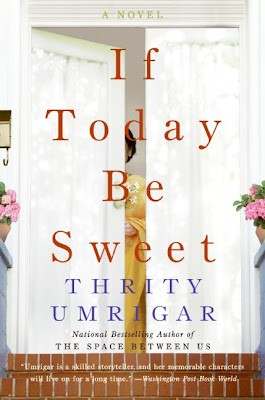 Publishers: Harper Collins
Publishers: Harper Collins| Price: | $24.95 |
| On Sale: | 5/29/2007 |
If I may start with a prediction...
Thrity Umrigar's latest book "If Today Be Sweet"
(its title is borrowed from a poem by Omar Khayyam) will be a darling of the book clubs because it covers a diverse range of themes, like home, family, widowhood, bereavement,community, immigration, culture clashes, the sterility of suburban life, neighbors, contemporary America... in other words, there is something for everyone to discuss.
Sorab Sethna is an Indian-born American who is conflicted because he no longer feels a pull towards his Indian roots. He has recently started to enjoy the American dream and the luxuries provided by this country and yet, something makes him feel guilty for doing so, especially as he recalls his disadvantaged fellowmen in India. His immediate dilemma is what to do with his widowed mother? Invite her to stay with them in the US (which would be very disruptive for him and his American wife) or should he let her return to Bombay to a life that she is familiar with?
Then you have Tehmina, the widowed Indian mother. She is on a visit to America where her son Sorab lives but she finds America so strange and foreign. Life is so regulated in this country, people are so law abiding and disciplined, but cold. She finds the pewter-colored skies of Cleveland dull and misses the warmth, color and chaos of the Bombay streets. She misses her talkative and friendly neighbors. In the rich suburb that her son lives in, it could be hours before you see someone walk down the street and even then they are hurrying by with no time to for a friendly chat.
Tehmina is torn between living with her only son and grandson in the US or returning to the life she is familiar with in Bombay. The reader feels for Tehmina because having to uproot herself to live with her son in a foreign (to her) country is not easy, especially at her age. What will Tehmina choose? Will America win her over as it does with most immigrants or will she return to India?
Then we have Suzanne, the American daughter-in-law who is so unused to looking after a helpless mother-in-law, a country bumpkin , but at the same time, she understands that she can't have her husband Sorab worrying about his mom all the way in India and thus is in favor of the mother moving in with them, except, she then wants a bigger house so that she has her "personal space", something that the Americans seem to crave, notes Tehmina with some amusement.
I see from the book (and from life around me) that immigrants, especially first generation, have very conflicted ideas about home. Where is home? Is it where you are physically located, or is it where your roots are or your heart is, or is home simply a state of mind? This book explores that to a large extent and you realize it is something all of us as immigrants have had to ask ourselves, but for many of us, the answer still eludes us.
Umrigar is probably one of my favorite Indian writers. If you haven't read anything by her I urge you to give her books a whirl. Her writing is tender, elegant and eloquent and she has the most endearing characters fill her books, you won't be disappointed.
You can find my review for "The Space Between Us", here
 This Edition: Hardcover
This Edition: HardcoverPublication Date: 06/2006
Price: $24.00
I just finshed reading Asha Miro's "Daughter of the Ganges".
What can I say about this book without giving too much away? I will tell you that it's a remarkable story of hope, love, perseverance, networking and probably something called luck. Anyway, it's about this girl called "Asha" ("hope" in Hindi) adopted as a young girl from an orphanage in Bombay by a family that lived in Barcelona. Neither Asha nor the family spoke a common language to begin with, so communication was by signs and gestures until Asha started to learn Catalan. Asha, like most adopted kids was always curious to know where she had come from and who her natural parents were and she was lucky that her adoptive parents always encouraged her to go in search of her story.
When she was twenty Asha decided to visit India with a group that was going to do some voluntary work in Bombay and Nasik (the city she was born in according to her birth certificate). Asha's description of her drive into the city of Bombay from the airport is my second favorite after "Shantaram's"...maybe I should start collecting literary descriptions of the ride in from Bombay airport as it obviously makes has a huge impact on people! :)
SHe makes contact with the convent in which she had lived in before the adoption and after a series of well-meaning lies that people told her about her past, she is able to finally unearth the truth of what happened... where she came from, who her family is, why they gave her up for adoption etc., thus filling in the blanks of her own personal crossword puzzle.
This is a very powerful story and one that you will enjoy reading. The translation from Spanish into English isn't one of the better ones, but even so, you will be touched tremendously and profoundly. I had tears streaming down my face often in the last 100pages or so of the book.
I am stopping here for now...sorry I couldn't give away everything or it would spoil the read for you.
Note: I have closed the comments box for this post only because I won't be around to read and answer the comments. Thank you for understanding.
